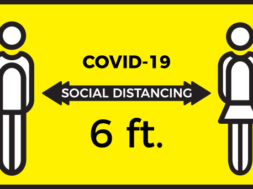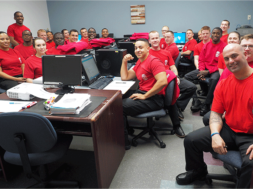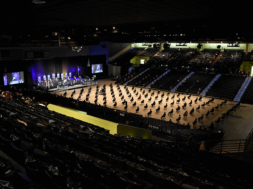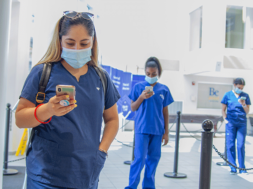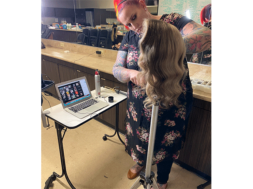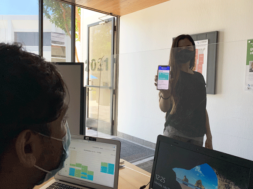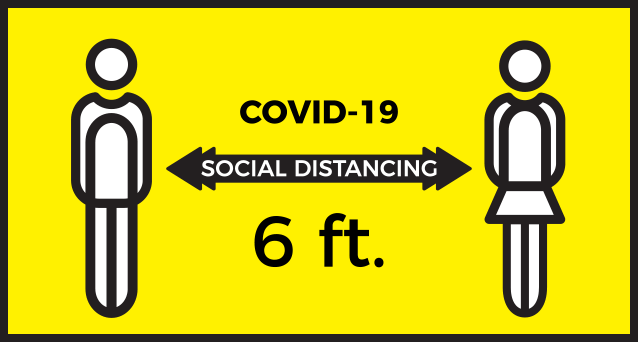
English: We do Think Online Education is Here to Stay in Some Fashion
Interview with Joel English, Executive Vice President, Centura College, Aviation Institute of Maintenance and Tidewater Tech
Below is our interview with Joel English, Executive Vice President of Centura College, Aviation Institute of Maintenance and Tidewater Tech. This interview took place at the end of May 2020.
The school system has 19 schools around the country. The broadest coverage is Aviation Institute of Maintenance schools. AIM has 13 schools, in major aviation towns across the country, from San Francisco to Atlanta and everywhere in between. There are about 4,000 students in the Aviation Maintenance Technician program, which prepares people for the FAA certification as an aircraft mechanic.
The Centura College and Tidewater Tech schools are in Virginia only. The school’s programs include the skilled trades like Welding, HVAC, Automotive Technician, Construction Electrician and even Carpentry. A new program in Wind Energy is launching in Virginia as the power companies are putting wind turbines offshore. Tidewater Tech is one school in Norfolk, Virginia and is the largest welding school in the southeast Virginia area.
CER: When COVID-19 was declared a national emergency, how did you proceed?
Joel English: We were able to move everything online for a 2-3 month period. We knew we had to react, and our first reaction was to quickly create a teach-out method for the current term. We had two more weeks in our current term before spring break happened. On March 13 we said we’re going to have to finish this in a completely revised method, whether it’s online or even giving students work to take home with them and do projects very quickly and get that complete.
Then we had to start preparing for an April term that started April 3 after our spring break that would be completely online. Between Microsoft Teams and GoToMeeting, we were able to train faculty and staff on the platform of their choice. On April 6 we started 19 schools all online.
Of course, these are very hands-on skilled trade programs that we’re talking about. What we did was preparing for only a five-week term; we took what would have been two courses worth of lecture content and really emphasized the lecture content for students. Obviously, it’s taken more than just five weeks. We’re still almost exclusively online now.
Within about a month we were able to create a social distancing method where rather than our classes of 20 coming onto the campus, we split them in half with groups of 10 or fewer and they would come and start doing the shop activities.
Right now if you stepped into any one of my campuses, you would probably see students in small groups that are doing the hands-on activities associated with what they’re learning online and really dividing the shifts of students into half so there are always 10 people or less in the shop activities.
We believe that on June 15 when we start another term, we’ll probably be able to have something that looks a little closer to normal, where all students will have something face to face and something online. Ultimately when we get out of this whole thing, we do think online education is here to stay in some fashion. I had a meeting this week with all my campus directors and asked the question, which of you believe that some form of online learning should become normal for us? The answer was 18 out of the 19 said, yes, my faculty is ready, my students are interested, and we would like to have this.
CER: I have a feeling many of our schools are going in that direction.
English: I’ve got a pretty strong distance education background and we’ve seen it work quite successfully. But if you would’ve asked me four months ago when will the AIM campuses have online learning; I would have said to you, it’s not quite right for this field and this type of instructor and even the interest level of the student. Our students want hands-on because they like the smell of grease and see themselves in a skilled trade environment. They don’t care to do online education. But once we were sort of forced into it, it became normalized incredibly quickly. Because we were forced into it, and it became normalized so quickly, we had students saying this is great; why didn’t we do this all the time? I drive an hour to get to school every day and if I could cut that down to driving half the time, it would save me money. It’s really become very authentic and normal for us.
CER: I was curious about how students would feel about remote learning.
English: The only negativity we’ve gotten, is a concern of I hope we do get back. There were no students who said this isn’t what I signed up for, this is ridiculous, and I want out. Believe it or not, our drop rate has been lower than normal during this time. It’s incredible. We usually would see a drop rate of about 2% in any given month. Last month, in April, we saw a 1% drop rate. That’s less than we usually would see. It’s really been positive in a lot of different ways.
CER: What kind of guidelines have you put in place to safely reopen?
English: We have a Coronavirus task force that we put together in the middle of March. This task force consists of five people. It consists of our Executive Director of Academic Affairs, who runs all instruction for our campuses, our Communications Director, our two Directors of Human Resources, the Director and Assistant Director and myself, the Executive Vice President. We meet every week and talk about everything, from governor’s orders and when they’re expiring, to the various things that we’ve done for our faculty and staff.
On the HR policy side of things, we’ve done some things for our staff that is very unique for us. For example, we have created an extra two weeks of sick leave for anybody who tests positive for Coronavirus. We also created a type of leave time for those who just didn’t feel comfortable coming to the campus. If they were out of vacation or sick time, we provided more for them. We just don’t want to force anybody into an environment they are not comfortable with.
As we’ve planned to bring students back into school and prepare for that, we’ve kind of kept the CDC current guidelines as our bible of what we will do and what we won’t do.
The first thing we did is created a set of posters that have all the CDC guidelines on them. We created 10 copies of that poster for all of our campuses and our home office. As students have come back, we purchased multiple no-touch thermometers for all the campuses and the home office. We take student and staff temperatures every day upon coming to work. As per CDC guidelines, if somebody has over 100.4, they’re asked to go home for the day and not come back until they’ve been fever free for 24 hours. That action is both technical and human focused. Technically we would want to know if anybody in the school has a fever or is experiencing the kinds of symptoms that would be related to COVID-19. It’s not just for the technical safety, it’s also for the feelings of the staff and students that we’re doing something extra and we’re taking these precautions.
In all of our schools, we’ve moved desks, chairs and training equipment so that students, faculty and staff can be six feet apart. We are encouraging face masks. We have made the decision not to require face masks because there are certain technical reasons. We don’t want to get into the question of what kind of face mask or face covering it is. We have provided enough face masks for all students, but don’t want to require it because we kind of stopped at the CDC guidelines exactly as written. Since the CDC has not required facemasks, it just recommends them, we too recommend and not require.
CER: You mentioned that if your staff didn’t feel comfortable returning that they had options. What about if students don’t feel comfortable?
English: We are continuing to offer online courses through June and we’re even considering the possibility of extending that into Aug. 1. So, we do have online coursework available for students. Any student that doesn’t feel comfortable doesn’t have to come back yet. But the longer they decide to wait, the more they have to make up the hands-on shop work. We do have some students who say I’m sorry, I’ve got an elderly parent, or I don’t want to expose my kids. They can make the choice to either extend their graduation date out or even take a full leave of absence. We do probably have more leave of absence students right now than we usually do. We’re not forcing anybody into being in a situation they’re not comfortable with. I think that’s important.
CER: Will any of your departments continue to operate remotely?
English: We continue to have a policy with our staff and faculty that allows folks to work from home one day a week. That’s the extent of where we went. Technically what that did was produced about 20% less foot traffic for faculty and staff. We also created a staggering shift situation where 1/3 of the staff comes in at 8:30 in the morning, another shift comes in at 8:15, and another shift comes in at 9:00. That’s just to reduce the foot traffic that’s present in the workday. But we haven’t moved to everybody works from home kind of situation. We have in all cases, except in one, been defined as an essential business because we’re delivering distance education. Almost every one of our states had a provision that institutions that are working to deliver online education are considered an essential business. That’s what has allowed us to keep people coming to work and keep the paychecks coming. We have not had full-scale layoffs or furloughs of any kind because of the nature of our being an essential business. We all feel pretty lucky to be able to continue with our jobs.
As the executive orders expire by the end of June, we will be back to work five days a week, rather than four days a week.
It’s a little difficult looking at a portion of your employees and saying, you can do your job from home totally; and looking at another portion and saying, sorry, you can’t do your work from home. Ultimately, we are an organization that’s centered on serving students.
CER: Have you had to change your marketing strategies for enrolling new students?
English: We did de-emphasize a little bit of the advertising in the months of April and May. Those are times when people often do a little less advertising anyway. But to the question of how we changed it, I would say the majority of our advertising is digital advertising anyway. We actually saw inquires increase some. We think that probably is because more people were looking for work or looking for what happens next in life. We felt like our advertising was in the right place, to begin with.
What we did change is the way we field those inquiries and the way we have given tours of the campuses. We have almost perfected a digital tour process where if you call in and say hey, I’m interested in being a welder, or a medical assistant, or an aviation mechanic, but I don’t know that I feel comfortable coming to your campus right now, our answer is not a problem. Let’s have that conversation and let me give you an online tour. Just about everybody has the ability to FaceTime.
CER: I thought you were going to say you sent them a video.
English: There certainly has been some of that. We do have a lot of digital assets that students can look at. But the one thing you can’t do on a prerecorded video is answer a question. So, when a student says, wait, show me that thing again … the synchronous video platform, such as FaceTime, on cell phones allows us to explore whatever the student takes an interest in.
CER: Have you had any issues regarding accreditation or state regulatory bodies?
English: We’ve obviously stayed very much in touch with them and have had nothing but very positive work with them. ACCSC is our main accreditor and we have a very close relationship with them. Yes, we had to apply and refresh our online plan, as per their guidance. I had no problem doing that.
For us, with the AIM campuses, the biggest thing is the FAA. Almost every instructional method, assignment, project and tool that we have has got to be approved by the FAA. That can be a challenge to get the FAA primary maintenance inspector to agree and approve what we do. But even there, with 13 aviation campuses, 13 different FAA offices to please, they were very much in favor of the way that we delivered online content and approved it in every case. Yes, there was a lot of regulatory work from the state, the accreditor and the FAA, but we were able to accomplish that every step of the way.
CER: What would you say has been your biggest challenge dealing with the pandemic and reopening?
English: I think probably the biggest challenge thus far has been trying to manage a situation that is completely fluid. In the first two weeks of this, from March 13 through the end of March, it was a challenge sitting around a conference room with three or four people who run the organization and spending an hour making a plan for what news came out early that morning, having a plan together, then walking out of the conference room and hearing something that completely made us have to throw it in the garbage. Over the first two weeks, that was hourly and daily. My first feeling was the feeling of great inadequacy. I’m pretty good at leading a meeting and making plans and doing things and to have it just decimated because of a new development was really something. I look back at those two months and I say if anybody was not experiencing that then they probably weren’t in touch with reality, because that was the reality. Anybody who felt like no, we made our plan and we stuck to it probably missed an opportunity. It seems like the order of the day was realizing you can’t control the situation.
CER: What do you think is the silver lining in all of this?
English: I could say a number of very technical and specific concrete things like we’re better at videoconferencing than we ever had been, and that’s true, or we’re more open to online learning and providing a flexible environment for students than we ever had been, and that’s absolutely true. But I think the real one, the deep one, is we in our group of schools relied more heavily on daily and weekly communication and openness with the leadership of every individual than we ever had before.
We’re more flexible and able to change and morph I think than we ever had been.
I certainly was a structured manager, and that structure is fine, but I’m more open to responding to the individual situations around an individual school than I think I had been geared toward before. I think the way that we manage will be more responsive, more sensitive than maybe it had been in the past. I think that even though that’s a little soft, it’s probably the brightest glow of silver lining in how we’ve been to respond to situations and be malleable in our leadership.
CER: Is there anything you want to add that I didn’t ask you?
English: I guess the one last thing I would add is the importance of praising staff and faculty during this time. When I think about the various answers that we had that helped us get through this time, almost all of those answers came from the idea that a faculty member had. It’s really honoring the individual on our teams in such a way that ends with praise, celebration and pointing out who has done an awesome job. I just think that has been crucial. It’s our responsibility that when something goes wrong, we ask that question of what went wrong here and how can we make sure that doesn’t happen again? I think the opposite question is so important: What went right here, and what can we do to make sure that it happens again and again and again and that we give proper credit for those who are responsible for coming up with that solution. If I was to give a piece of advice to anybody going through anything like this, I would say communicate for sure, equip-they need that, but man, you’ve got to praise them at the end. That really solidifies the awesome behavior that we want to see happen again.
